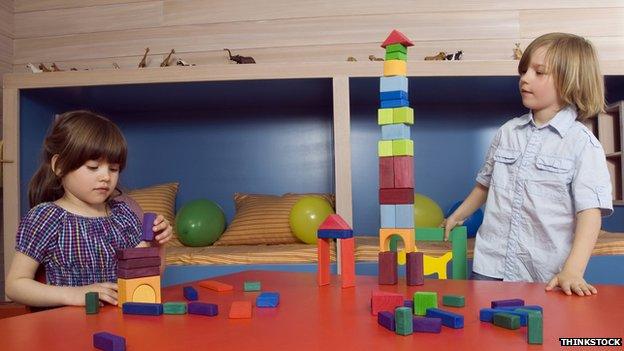Reality Check: How much will Tory policies cost?
- Published

Unveiling his party's manifesto today, David Cameron said: "All our commitments are fully funded as part of our fiscal plan."
It's a bit tricky to see how. The document is still putting £30bn as the amount the Conservatives need to save through spending and welfare cuts and clamping down on tax avoidance and evasion.
So, how will today's new pledges be paid for? The three key undertakings were to allow people living in housing association properties to buy them, to legislate to make sure minimum wage-earners do not pay income tax and to double the amount of free childcare for three and four-year-olds.
So let's take those one at a time. Starting with the housing association right-to-buy policy, it's not clear how many housing association tenants will be able to afford to buy their houses, even at discounted prices. Newsnight's Chris Cook cites figures suggesting that only 23% of housing association tenant households have anyone in full-time work and two-thirds of them are in receipt of housing benefit.
Regardless, the Conservatives say that the policy will be paid for by making local authorities sell their more valuable council houses when they become vacant.
The minimum wage policy is a bit tricky, because the prime minister's promise that minimum-wage earners will not have to pay income tax only covers those working up to 30 hours per week. That means the pledge is already being met because someone working 30 hours a week at minimum wage is below the threshold for paying income tax. The minimum wage for those over 21 is £6.70 an hour, which is £10,452 a year. Currently, the threshold for paying income tax is £10,600.
The Conservatives plan to raise the income tax-free allowance to £12,500 by 2020, which means that unless the minimum wage (based on advice from the Low Pay Commission) rises above £8 an hour, they will be OK with this pledge at no extra cost.
It is the doubling of free childcare for three and four-year-olds that looks expensive. The promise is to give families in which all parents are working, 30 hours a week of free childcare for three and four-year-olds (who have not yet started school) instead of 15.
This isn't actually a doubling of the childcare available, as the 15 hours a week are currently available for all three and four-year-olds regardless of whether their parents are working.
Mr Cameron said the policy would be worth £5,000 for qualifying families. Education Secretary Nicky Morgan later said that included the 15 hours they were already getting, so it is only an extra £2,500 per household.
She also told BBC News it would be paid for with £350m of the £1.4bn that would be raised by reducing pension tax relief for the most highly paid people. The rest of that money is earmarked for raising the threshold at which inheritance tax has to be paid.
That money would fund £2,500 of childcare for 140,000 families. The Office for National Statistics estimates, external that last year there were about 550,000 households in which all parents were working and whose youngest child was three or four.
We need to subtract some of those households because not all three-year-olds are yet eligible for free childcare ad some four-year-olds are already in school.
We also have to add some for lone parents, about 40% of whom are in employment (with youngest children aged between nought and four) and also for households in which the three or four-year-old is not the youngest child.
After all that, it appears clear that the Conservatives have not set aside enough money to pay for this policy.
And that's before we start on other recent policies not unveiled in the manifesto, such as the extra £8bn for the NHS.
Update, 1730 BST: The Conservatives have been in touch to say that the £350m figure is a Treasury costing.
Now, I haven't seen their workings, but I understand the point is that they expect more free childcare to mean more parents will go out to work, which reduces the benefits bill.
There is some disagreement about the extent to which this happens. The IFS, for example, has been quite critical of the extent to which better childcare provision increases employment among mothers.
Update II, 1820 BST: I have now had more details of how the Treasury worked this out. Apparently it's not about more people going to work, it's to do with people getting free childcare instead of paying for it with tax credits or tax-free with vouchers.

Election 2015 - Reality Check

What's the truth behind the politicians' claims on the campaign trail? Our experts investigate the facts, and wider stories, behind the soundbites.
Read latest updates or follow us on Twitter @BBCRealityCheck, external
